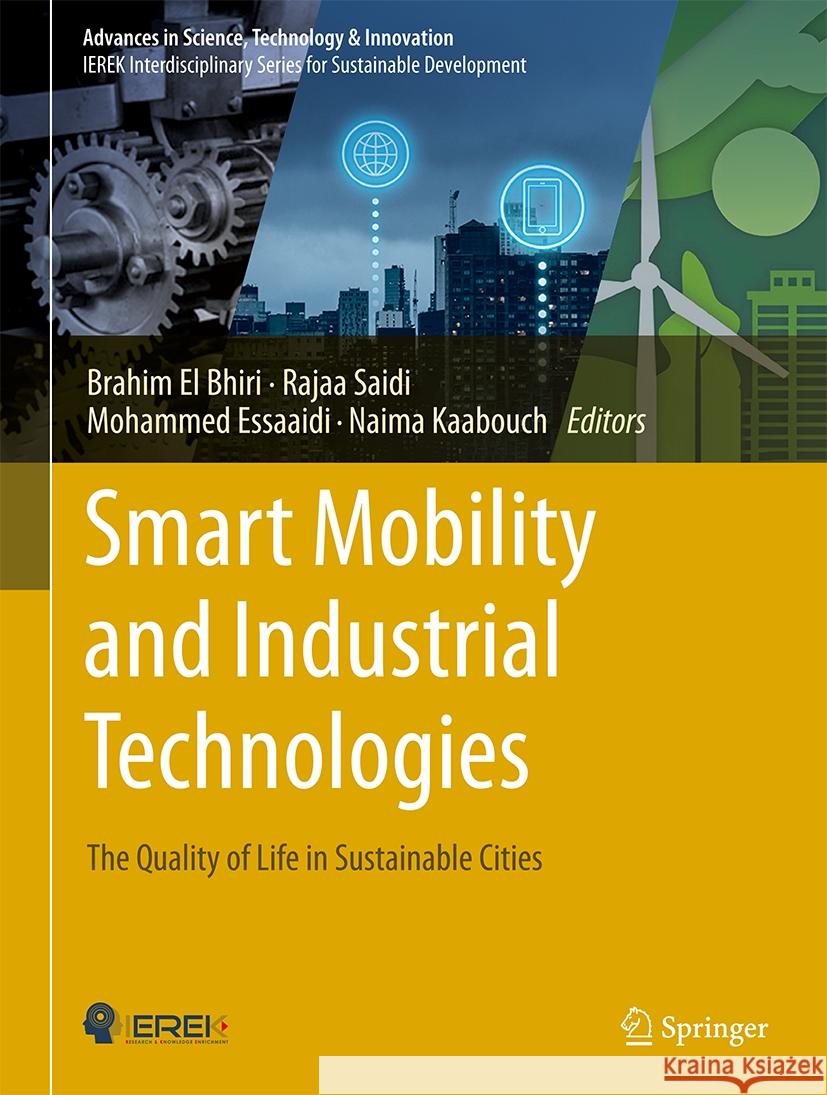


ISBN-13: 9783031468483 / Angielski
ISBN-13: 9783031468483 / Angielski
Advanced technologies for smart mobility in smart cities.- Emerging technologies for connectivity in sustainable cities.- Transitioning to Sustainable Industrial Engineering.- Technologies in Human sciences as key components of Sustainability.
Prof. Brahim El Bhiri is a full professor of Telecommunication and Embedded Systems at the Moroccan School of Engineering Sciences. He is the director of R&D&I at the same school and the head of SMARTiLab Laboratory of Research, Development, and Innovation. He has over 12 years of experience in the field of electronics, wireless sensor networks, data processing, embedded system, and green energy. He has published more than forty papers in international scientific journals and international conferences. He is an author of two books and ten book chapters, published by leading international publishers like Springer. He has received a number of awards, one of them a best paper award from Italy at the seventh SENSORCOMM’2013 International Conference. In addition, he is a co-editor of three SI published by very known publisher. Prof. Brahim El Bhiri is a reviewer at more than five scientific journals and researcher and deputy project manager of several projects and he is a member of several TPC for lot of national and international conferences.
Prof. Rajaa Saidi is a full professor of computer science at the National Institute of Statistics and Applied Economics (INSEA-Morocco). She is a member of the Information Systems, Intelligent Systems, and Mathematical Modelling Laboratory (SI2M) of INSEA. She holds a Ph.D. degree in Information Systems and Software Engineering from Mohammed V University in Rabat (UM5-Morocco) and the Grenoble Institute of Technology (INPG-France). She is also a member of the Computer Science and Telecommunications Research Laboratory (LRIT) of the Mohammed V University. Her research areas include information systems engineering, business process management, ubiquitous computing, context-aware information systems, service-oriented architectures, and component-based engineering. She has published several papers in international journals and conferences on these topics. She is the chair of ICATH’21 conference and the first editor of the Advanced Technologies for Humanity book.
Prof. Mohamed Essaaidi is the chief of Party of Interactive Digital Center Morocco (since November 2020) and a professor and past dean of ENSIAS School of Computer Science of Mohammed V University, Rabat, Morocco (since 2011), past director of International Cooperation at the Ministry of General Affairs & Governance, Morocco (2019), and past faculty member (professor and assistant professor) at the Faculty of Science of Abdelmalek Essaadi University, Tetuan, Morocco (1993–2011). Furthermore, Prof. Essaaidi is the founder and the general chair / co-chair of several IEEE technically sponsored international conferences such as Information and Communication Technologies International Symposium (2005, 2007), NATO Advance Research Workshop on Information Security Assurance (2005), and International Conference of Multimedia Computing and Systems series (2009–2016).
Dr. Naima Kaabouch is currently a full professor, director of the Artificial Intelligence Research (AIR) Institute, and lead of Cybersecurity & Data Chain in the Research Institute For Autonomous Systems (RIAS) at the University of North Dakota. Her main research interests include artificial intelligence, wireless communication and networking, cybersecurity, sensing, and autonomous systems. She is the PI/CoPI/CoI of numerous grants funded by federal agencies and state sources, including the National Science Foundation (NSF), National Aeronautics and Space Administration (NASA), Federal Aviation Administration (FAA), ND Chamber of Commerce, EPSCoR/NSF, and EPSCoR NASA. She is the author and co-author of over 200 peer-reviewed journal and proceeding papers, three pending patents, and the author of four research books and handbooks. She is also the recipient of numerous awards in research, education, and service, including the 2016 UND Outstanding Faculty Scholar in Research, Teaching, and Service in 2016.
This book discusses many issues related to the impact of advanced technologies on quality of human life. It covers several areas and use cases that illustrate how technologies could be harnessed to solve all kinds of humanity issues in areas as diverse as education, health care, industry, agriculture, mobility, etc. Specially, it aims at establishing the vital link between advances in technology and sustainable development to magnify the benefits. This book covers a wide range of audience including academic/research, professors, scientists, and engineers working in different fields, comprising engineering, sustainability, as well as government and international organizations officials interested in sustainable planning. This is done through a set of selected papers from those presented to 4th International Conference on Advanced Technologies for Humanity (ICATH'2022) which was organized by the Moroccan School of Engineering Sciences (EMSI) in collaboration with national and international institutions. ICATH22 was held in Marrakech, from November 11 to 12, 2022. Key topics showcasing how technology can serve humanity in different ways and facets of human life, activities, and challenges are covered in depth through the chapters of this book which are presented in four different sections, namely:
1. Advanced Technologies for smart Mobility in Smart Cities.
2. Emerging Technologies for Connectivity in Sustainable Cities.
3. Transitioning to Sustainable Industrial Engineering.
4. Technology for Human Sciences as Key Components of Sustainability.1997-2025 DolnySlask.com Agencja Internetowa







